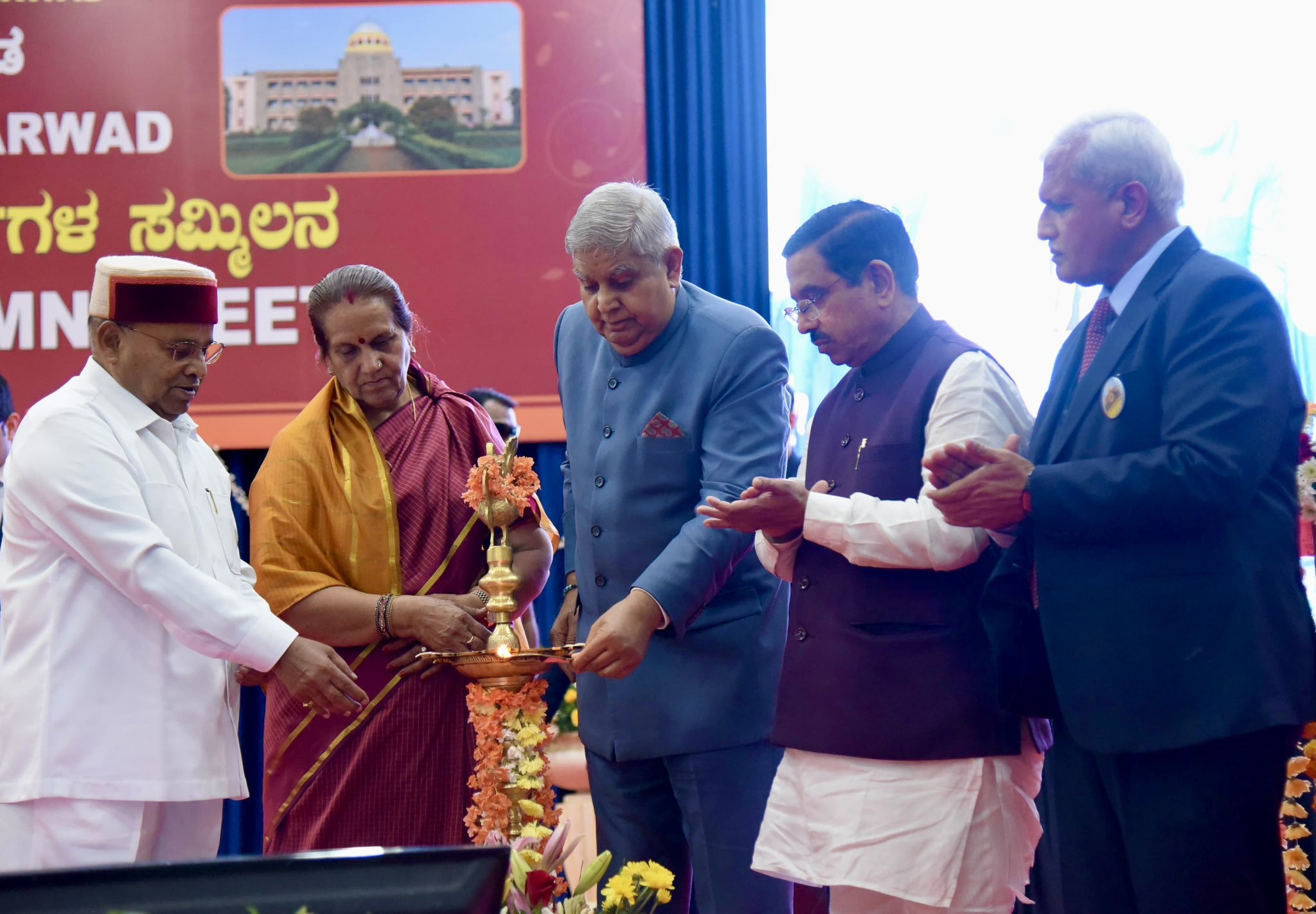VP Dhankhar Inaugurates ‘Sumeru Parvata’ in Dharwad, Emphasizes Spiritual Power and Ethical Conduct
Shri Dhankhar highlights India’s ancient wisdom, the transformative power of spirituality, and the importance of balancing material progress with spiritual growth in his address.

- Country:
- India
Vice-President of India, Shri Jagdeep Dhankhar, today inaugurated the ‘Sumeru Parvata’ at the Sri Navagraha Teertha Kshetra in Dharwad. During his address, Shri Dhankhar emphasized the significance of India’s spiritual strength and its role in shaping a peaceful and harmonious global society. He called attention to the country's temples, which he described as a network of spiritual power transcending even nuclear energy. Key Highlights of the Address:
Spiritual Power of India: Shri Dhankhar spoke passionately about the Adhyatmik Shakti (spiritual energy) of Bharat, stating that this energy has been preserved and nurtured for thousands of years, despite numerous assaults on it. "Our temples form a network of Adhyatmik Shakti, a transformative power with the ability to bring about profound, positive change. We have preserved our Adhyatmik Shakti through India’s Sanatan Mulya (eternal values)," he said, reflecting on the enduring legacy of India’s spiritual traditions. He further emphasized that Bharat is the land where eternal wisdom guides humanity toward peace.
Anekantavada and Global Diplomacy: Reflecting on India’s ancient wisdom, Shri Dhankhar highlighted Anekantavada, the doctrine of multiple viewpoints. He pointed out that this principle offers a valuable framework for today’s global diplomacy and complex international relations. "Anekantavada teaches us the importance of dialogue and the recognition that there are always multiple perspectives. It encourages us not to be arrogant in our viewpoints but to engage in respectful dialogue, allowing for a broader understanding of issues," he said.
Three Jewels of Indian Philosophy: Shri Dhankhar spoke about the three guiding principles of Ahimsa (non-violence), Aparigraha (non-possessiveness), and Anekantavada (multi-perspectivism). He described these not as mere words, but as fundamental life principles that shape India’s civilization. He suggested that these principles offer profound solutions to global challenges, such as violence, overconsumption, and ideological polarization. "These teachings are part of India’s 5,000-year-old civilization and its rich repository of knowledge," he stated, underscoring the deep philosophical and ethical values embedded in Indian culture.
Balancing Material and Spiritual Growth: Shri Dhankhar emphasized the need for a balance between material progress and spiritual development. He stated that true development (Vikas) must not focus solely on material achievements but also on fostering spiritual growth. "India carries the message of being a Vishwa Guru (global teacher) by harmonizing material progress with spiritual advancement. This balance is crucial for leading a life filled with satisfaction, peace, and solace," he added.
Environmental Crisis and Sustainable Development: Addressing the global environmental crisis, Shri Dhankhar highlighted the relevance of Jain principles in today’s context. The values of Ahimsa and mindful resource utilization, he said, provide essential solutions for sustainable development. "In an era where environmental degradation has become an existential challenge, the Jain principles of non-violence and frugality offer a path toward sustainable growth, especially as we aim for a Viksit Bharat (developed India) by 2047," he remarked, linking ancient wisdom with modern global challenges.
Ethics and the Role of Sacred Institutions: Shri Dhankhar stressed the importance of maintaining the highest ethical standards in personal and societal conduct. "Ethics is non-negotiable in our culture. Diluting ethical values compromises peace and self-contentment," he said. He highlighted that institutions like maths (monasteries) and mandirs (temples) play a crucial role in teaching and instilling ethical conduct in society. "These institutions are not merely places of worship, but vibrant centers of education (shiksha), healthcare (chikitsa), and service (seva), where ancient wisdom is adapted to meet contemporary challenges," he stated.
Importance of Sacred Spaces: Reflecting on the significance of religious and sacred spaces, Shri Dhankhar said that these institutions go beyond religious practices and contribute to social change. "Our sacred spaces are dynamic centers that address the holistic development of individuals and society. They teach us to live with equality and without discrimination, continuing India’s tradition of seva (service) to all," he emphasized.
Message for the Youth:
In his concluding remarks, Shri Dhankhar called on the youth of India to be aware of the rich spiritual and ethical heritage that has shaped the country’s identity over thousands of years. He encouraged them to take pride in India’s legacy and integrate it into their lives to contribute to a balanced, peaceful, and prosperous future.
Vision for Bharat:
Shri Dhankhar concluded by stressing the importance of preserving and promoting India’s ancient wisdom while addressing contemporary challenges. "The teachings of Ahimsa, Aparigraha, and Anekantavada have timeless relevance. India must continue to be a beacon of light, not just for material progress but for spiritual growth that can guide the world toward a more peaceful and sustainable future."
This inauguration marks a pivotal moment in the ongoing journey to promote India’s spiritual leadership, not only within the country but also globally, with the vision of an empowered and harmonious world.
- READ MORE ON:
- Jagdeep Dhankhar
- Sumeru Parvata










